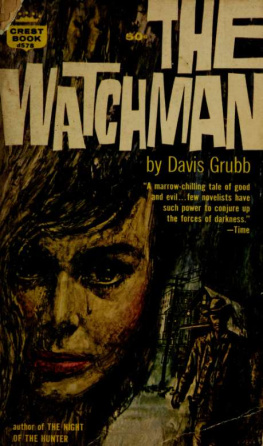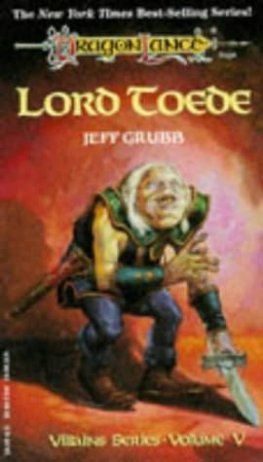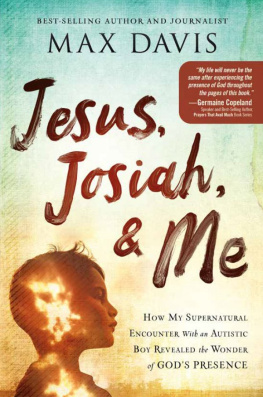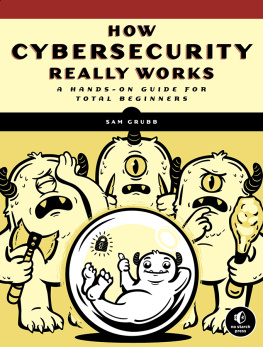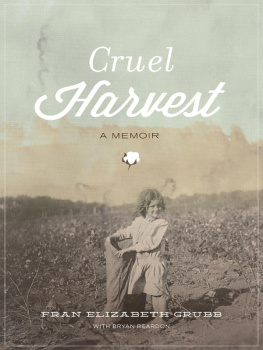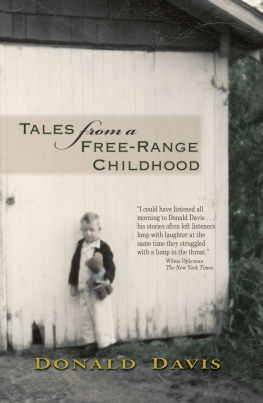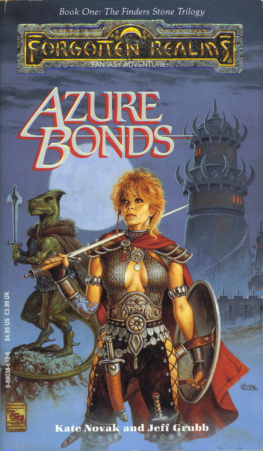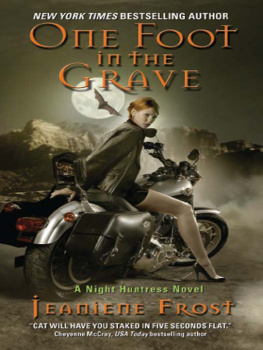Davis Grubb - One Foot in the Grave: Twelve Tales of Suspense and the Supernatural
Here you can read online Davis Grubb - One Foot in the Grave: Twelve Tales of Suspense and the Supernatural full text of the book (entire story) in english for free. Download pdf and epub, get meaning, cover and reviews about this ebook. publisher: Arrow, genre: Detective and thriller. Description of the work, (preface) as well as reviews are available. Best literature library LitArk.com created for fans of good reading and offers a wide selection of genres:
Romance novel
Science fiction
Adventure
Detective
Science
History
Home and family
Prose
Art
Politics
Computer
Non-fiction
Religion
Business
Children
Humor
Choose a favorite category and find really read worthwhile books. Enjoy immersion in the world of imagination, feel the emotions of the characters or learn something new for yourself, make an fascinating discovery.

- Book:One Foot in the Grave: Twelve Tales of Suspense and the Supernatural
- Author:
- Publisher:Arrow
- Genre:
- Rating:5 / 5
- Favourites:Add to favourites
- Your mark:
- 100
- 1
- 2
- 3
- 4
- 5
One Foot in the Grave: Twelve Tales of Suspense and the Supernatural: summary, description and annotation
We offer to read an annotation, description, summary or preface (depends on what the author of the book "One Foot in the Grave: Twelve Tales of Suspense and the Supernatural" wrote himself). If you haven't found the necessary information about the book — write in the comments, we will try to find it.
One Foot in the Grave: Twelve Tales of Suspense and the Supernatural — read online for free the complete book (whole text) full work
Below is the text of the book, divided by pages. System saving the place of the last page read, allows you to conveniently read the book "One Foot in the Grave: Twelve Tales of Suspense and the Supernatural" online for free, without having to search again every time where you left off. Put a bookmark, and you can go to the page where you finished reading at any time.
Font size:
Interval:
Bookmark:
Twelve Tales of Suspense and the Supernatural
By Davis Grubb
CHARLES SCRIBNER'S SONS New York
Copyright 1964 Davis Grubb Copyright 1946, 1949, 1950 The Crowell-Collier Publishing Company Copyright 1947 Weird Tales Copyright 1953 Fawcett Publications, Inc. Copyright 1954 Hillman Periodicals, Inc. Copyright 1963 Davis Publications, Inc.
A-2.64[V] THIS BOOKPUBLISHED SIMULTANEOUSLYIN THE UNITED STATES OF AMERICA AND IN CANADACOPYRIGHT UNDER THE BERNE CONVENTION ALL RIGHTS RESERVED. NO PART OF THIS BOOK MAY BE REPRODUCED IN ANY FORM WITHOUT THE PERMISSION OF CHARLES SCRIBNER'S SONS.
Acknowledgments: "The Horsehair Trunk" and "The Return of Virge Likens" appeared originally in Collier's, "Busby's Rat" in
Cavalier, "Where the Woodbine Twineth" in Ellery Queen's
Mystery Magazine as "You Never Believe Me," "One Foot in the Grave" in Weird Tales, "Wynken, Blynken and Nod" in Nero Wolfe
Mystery Magazine, and "The Rabbit Prince" in The Woman's Home
Companion.
PRINTED IN THE UNITED STATES OF AMERICA
Library of Congress Catalog Card Number 64-13272
FOR James Bradley Schiller
THIS was what made the memory of that summer such a troubling thing: There was no moral to it. Preachers searched for it and the whispering women and the loafers on the long porch of the Brass House pondered over it years after. Some laid all the blame on old Busby and some on Jonas Tanner. But the women laid it mostly on Busby's daughter, Eliza, because she was beautiful and they could not forgive her that. In the end there was no answer and no lesson. Captain Gunn used to say that the river itself was the real criminal. But you cannot hang a river. Old Busby was no fool. Once he had been the finest pilot on the Ohio. Captain Gunn used to tell of the time when he and Busby were partners on the Prairie
Belle. Even then Busby hated the river. He would stand at the pilot wheel like a man with a whip lash- ing a great and treacherous beast before him. And in the end, what he feared most happened: The river turned on him.
This was 15 years after what Captain Gunn always referred to as the "Trouble Between the States," and he and Busby were now partners on the Phoenix out of Louisville. A boiler exploded three miles below Shawneetown, and Busby was pinned beneath a cotton bale on the boiler deck with the live steam playing steadily, mercilessly on his legs.
Captain Gunn, by some miracle, had escaped without a scratch and, all that night, had helped get the wounded and dying to Shawneetown. Busby was left for dead on the counter of a general store, and then at midnight he had begun to scream again and the doctor amputated both legs.
In the spring Captain Gunn brought Busby and his small daughter Eliza back to Cresap's Landing and secured for him the position of wharfmaster. There Busby sat day in and day out for 20 years on a little calico pillow, glowering at the river. He and his daughter lived in the two rooms at the fore of the little wharf boat. The rest of it was storage room for freight; aft there was a room with sleeping accommodations for passengers who had to wait overnight for the morning packet.
Such a traffic of gamblers and whores and riverscum came and went there that it was a wonder Eliza had not actually grown up to be as wanton as the women of the Landing said she was. She was a dark, ripe girl with hair as rich and shining as a kettle of blackberries. Legend had it that Busby had murdered her Creole mother in Natchez when the girl was still a baby, then had fled north with a price on his head and gotten a pilafs berth in the Ohio trade. Yet the women of Cresap's Landing never hated Busby so much as they hated his daughter. And they whispered darkly as they watched the girl ripen into womanhood with the brooding beauty of a river willow.
Still, the thing that made Busby the talk of every riverman on the Ohio was not his temper nor his twisted body nor his beautiful daughter. It was the rats. Captain Gunn always said that Busby loved the creatures because they were the only living things that the river could never beat. From Pittsburgh to New Orleans they thrived along the banks among the mud and litter of Hood-borne trash, Hitting soundlessly along the shores at dusk and dawn-huge and grey and immortal.
When the spring floods washed thousands of them from their warrens, it would seem that the last of their kind had been sucked into the yellow waters forever. But when the river fell, and left the reeking, naked bluffs studded with the wreckage of houses and trees and the bloated bodies of livestock, the rats were always there again, darting like nervous shadows under the willows.
The river had turned on Busby, broken him and left him to rot out his destiny on the deck of a wharfboat. But the river could not beat the rats. They were immortal. Busby loved them for that. It had to be the answer, though Captain Gunn did not like to think about it often....
One night, many years after the tragedy on the
Phoenix, he went down to the wharfboat to pay Busby a friendly call. It was a warm June night just after sundown, and Captain Gunn could see Busby on his little cushion on the deck, his huge shoulders towering above his ruined body, his shaggy, dark head bent a little in the half-light. Captain Gunn stopped on the bricks at the head of the landing and stared, almost unbelieving. Busby was speaking in a low voice to someone. And yet there was no one there. Captain Cunn could not make out the words but there was something gentle and coaxing in the tone that was unlike Busby's usually loud and profane speech. Then Captain Cunn saw the rats.
For an instant he was sure they were the shadowy tricks that river dusk plays on men's eyes. He could not bring his mind to believe what he saw. There were a dozen of them-huge grey creatures, sitting on their haunches in a semi-circle around Busby like a litter of begging pups.
Busby had a bread loaf between the stumps of his legs and he was tearing off little bits of it and holding them out for the rats to take. There was something almost appealingly human in their aspect. Their little paws were like hands, and their black eyes were twinkling with an almost child-like pleasure. The most awesome of them seemed to be their leader. Captain Gunn said it was the largest rat he had ever laid eyes on, and he had seen rats on the Memphis waterfront that could kill a feisty dog. This rat was nearly two feet from its whiskers to the tip of its tail, and it sat in the very center of the semi-circle just a few inches from Busby's calico cushion.
Captain Gunn gave up all notions of paying Busby a visit that night, and yet he could not tear himself away from the horrible and yet, somehow fascinating, spectacle. In a few moments the bread was all gone, and then Busby dipped into the pocket of his old pilot's coat and pulled out something shiny. It was a mouth harp. Captain Gunn could barely see him now as the fog reached up from the cattails along the shore, but he could hear the music. And he was never likely to forget the tune-"Old Dan Tucker." Nor would he ever likely forget the sight, faint and blurred but unmistakable, of old Busby reared back against the wall of the cabin playing his mouth harp and keeping time with his head while the rats pranced and frolicked about him on the deck like dancers at a cotillion.
Captain Gunn left then. He hurried up to the bar of the Brass House and had two stiff drinks of bourbon as fast as he could get them down, saying not a word to anyone that night about what he had just witnessed. It was a long time before he could bring himself to speak of it. After a while he tried not to think of it at all.
Nobody might ever have known about the rats if Jonas Tanner hadn't met Eliza Busby that summer and fallen in love with her. Jonas was Captain Cunn's nephew, a man in his middle thirties, dark and earnest- looking with the pale, sallow complexion of people with heart disease. Captain Gunn had felt that the pleasant river voyage from Wheeling to Cincinnati might improve his nephew's health, so he had arranged cabin passage for him.
Font size:
Interval:
Bookmark:
Similar books «One Foot in the Grave: Twelve Tales of Suspense and the Supernatural»
Look at similar books to One Foot in the Grave: Twelve Tales of Suspense and the Supernatural. We have selected literature similar in name and meaning in the hope of providing readers with more options to find new, interesting, not yet read works.
Discussion, reviews of the book One Foot in the Grave: Twelve Tales of Suspense and the Supernatural and just readers' own opinions. Leave your comments, write what you think about the work, its meaning or the main characters. Specify what exactly you liked and what you didn't like, and why you think so.

